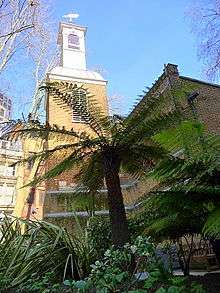Sir Herbert Whitfield
Sir Herbert Whitfield (1617–1677) was an English lawyer and landowner, whose pedigree and arms were recorded in both the 1619 Visitation of Kent[1] and the 1623 Visitation of Surrey.[2]
Early life
The eldest son and heir of Sir Ralph Whitfield,[3] lawyer and landowner, and his wife Dorothy, daughter of the antiquary Sir John Spelman, he had a sister Dorothy and three younger brothers: Henry,[4] Ralph[3] and Roger.
He first embarked on legal training at Gray's Inn, where he was admitted on 2 March 1632,[3] and then went on to university, being admitted to Corpus Christi College, Cambridge in 1635.[3] Following his father as a successful lawyer in London, he was knighted on 18 June 1641[3] at Whitehall Palace.[5] In 1645, jointly with his mother, he became heir to his father's lands and considerable other assets.
In 1648 a legacy of his father's work in Ireland resurfaced when the Worshipful Company of Merchant Taylors attempted to obtain evidences of their landholdings in County Londonderry. The original papers, they ascertained, were in the hands of Sir Ralph's three executors, who were his widow Dorothy, Sir Thomas Fotherley, the father of his son-in-law John Fotherley, and Herbert his eldest son.[6]
After 1660, he sold his father's manor of Burmarsh in Kent[7] but on 18 May 1675 was party to a deal over marshland at Barking in Essex[8]

He was buried on 16 September 1677 in the church of St Botolph's, Aldersgate, London.[3] After his death the family's original estate at Tenterden, that his great-grandfather had acquired, was sold.[9]
Family
About 1648 he married Margaret Peirson,[4] daughter of Richard Peirson, owner of a prosperous business in the City of London as a woollen draper and a member of the premier livery company, the Merchant Taylors. Her mother was Elizabeth Criche, daughter of another Merchant Taylors member, Edmund Criche. She was born in 1622 and died after 1664. Her unmarried brother Richard Peirson became a lawyer and landowner. They had seven children, including:
- Herbert (born 1650),[10]
- Thomasine (born 1652)[11]
- Dorothy (born 1659)[4]
- Arabella (born about 1655), the only one known to have married and had children, who married her first cousin Ralph Whitfield (about 1651–1694).
- Henrietta (born 1659)[11]
References
- H. Farnham Burke, ed. (1898), The Visitation of Kent : taken in the years 1619–1621 by John Philipot, Rouge Dragon, Marshal and Deputy to William Camden, Clarenceux, London: Harleian Society, p. 90, retrieved 9 February 2016
- Bruce, William, ed. (1899), The visitations of the county of Surrey : made and taken in the years 1530 by Thomas Benolte, Clarenceux king of arms ; 1572 by Robert Cooke, Clarenceux king of arms ; and 1623 by Samuel Thompson, Windsor herald, and Augustin Vincent, Rouge croix pursuivant, marshals and deputies to William Camden, Clarenceux king of arms, London: Ye Wardour Press, pp. 218–219, retrieved 9 February 2016
- Venn (1927), Alumni Cantabrigienses, 1, pp. 392–3, retrieved 8 November 2015
- Extracts from will of Richard Peirson, gentleman of Biddenden, dated 13th July 1664 and proved 2 March 1671 in the Prerogative Court of Canterbury, retrieved 9 November 2015
- The Knights of England. A complete record from the earliest time to the present day of the knights of all the orders of chivalry in England, Scotland, and Ireland, and of knights bachelors, incorporating a complete list of knights bachelors dubbed in Ireland, retrieved 8 November 2015
- Memorials of the Guild of Merchant Taylors of the Fraternity of St. John the Baptist, in the City of London: and of its associated charities and institutions, p. 556, retrieved 8 November 2015
- Hasted, Edward (1799), "Parishes: Burmarsh", The History and Topographical Survey of the County of Kent, 8, Canterbury, pp. 258–264, retrieved 4 November 2015
- Essex Record Office D/DHt T15/2, retrieved 8 November 2015
- Hasted, Edward (1799), "Parishes: Tenterden", The History and Topographical Survey of the County of Kent, 7, Canterbury, pp. 200–219, retrieved 4 November 2015
- Malcolm, James Peller (1803), Register of St Giles Cripplegate in Londinium Redivivum Or an Antient History and Modern Description of London Compiled from Parochial Records, Archives of Various Foundations, the Harleian Mss. and Other Authentic Sources, 3, London: Nichols and Son, p. 293, retrieved 8 November 2015
- Miller, William (1867), London Before the Fire of 1666 With an Historical Account of The Parish, The Ward, and the Church of St. Giles without Cripplegate Brought Down to the Present Time, London: J.H. Woodley, retrieved 8 November 2015